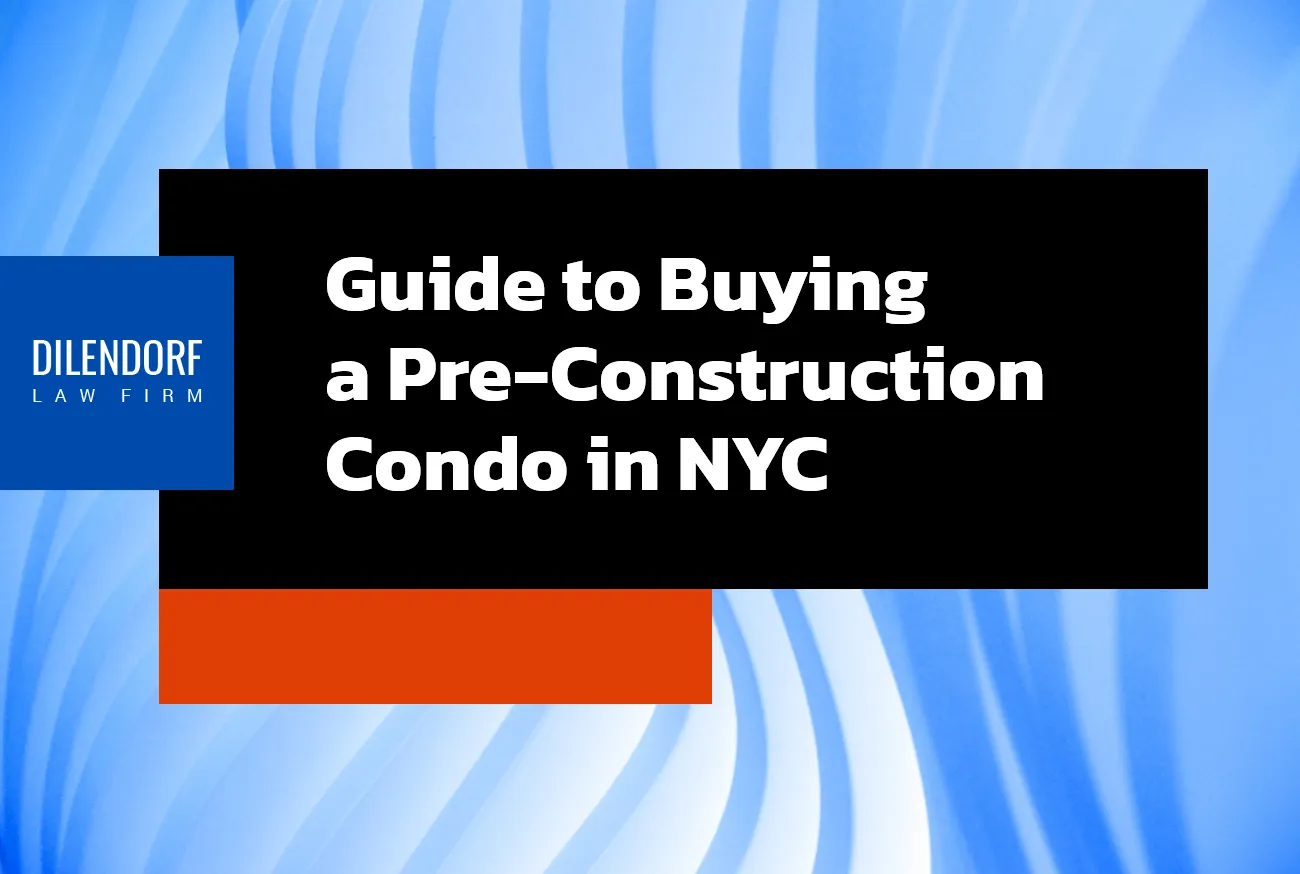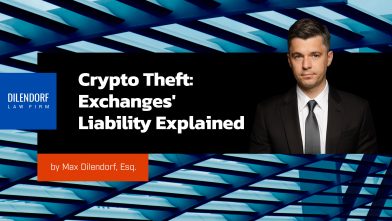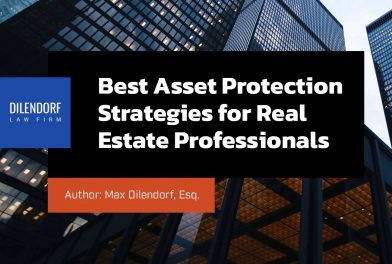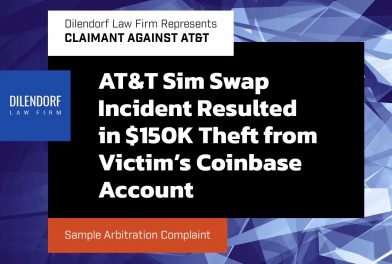Foreign Buyers Investing in NYC Real Estate | 6 Common Mistakes
To discuss your purchase of NYC real estate and tax-related questions, please contact Max Dilendorf to schedule a consultation. Email: md@dilendorf.com. Phone: 212.457.9797.
Dilendorf Law Firm represents international clients with the purchase of New York City real etate (including condos, office buildings, multifamily buildings and retail properties).
As part of our international real estate practice, we identified the top critical issues in the process of multinational clients investing in NYC real estate.
We prepared this summary addressing the common pitfalls every foreign buyer should know before planning.
Not asking the right questions during the planning stage of investing in New York real estate could lead to unforeseen tax liability, defeating the entire purpose of the investment.
The need for a trust structure, double tax treaty relief, or a liquidation plan in real estate transactions depends on specific circumstances and must be evaluated individually.
Pre-purchase legal and tax planning can minimize a foreign buyer’s legal responsibilities and maximize tax savings with regard to income, gift, estate taxes, and FIRPTA withholding when it comes to investing in New York real estate.
Specifically, this summary discusses:
- Non-U.S. citizens purchasing New York real estate individually is a mistake due to potential legal liabilities and tax exposure.
- Buying New York City properties using limited liability companies (LLCs) is discouraged as it may not provide the desired level of protection and tax optimization.
- Not claiming bilateral tax treaties when purchasing NYC real estate is an expensive oversight that could result in unnecessary tax burdens.
- Not asking the right questions when buying U.S. real estate could lead to disastrous legal and tax liability.
- Not considering the use of a U.S. or foreign trust to buy/hold NYC real estate limits potential tax savings and protection benefits.
- Not considering the advantage of using a NYC blocker structure for holding U.S. real estate limits the ability to optimize tax and legal protection.
- After the initial purchase planning, the next steps include ongoing tax and legal compliance and estate planning.
- Non-U.S. citizens purchasing New York real estate individually is a mistake due to potential legal liabilities and tax exposure.
Investing in New York City directly in one’s name as a foreign investor is the most basic form of ownership but also the most vulnerable to estate and gift taxes, personal liability, income tax reporting obligations, and Foreign Investment in Real Property Tax Act (FIRPTA) withholding tax.
The U.S. Estate Tax is a significant risk for foreign investors in U.S. real estate who are unaware of the tax implications. The current federal estate tax exemption for nonresident aliens is only $60,000 in 2023, while U.S. citizens have an exemption of $12.9 million or almost $26 million for married couples.
Upon death, noncitizens who are not residents of the U.S. are subject to U.S. estate tax on their U.S. real estate holdings. For example, if a nonresident’s Manhattan condominium is worth $2 million at the time of death, after subtracting the $60,000 exemption, $1,940,000 will be subject to estate tax. The combined state and federal estate tax could be as high as 50%, resulting in an estate tax bill of over $970,000 for the deceased estate to inherit the condominium.
- Buying New York City properties using limited liability companies (LLCs) is discouraged as it may not provide the desired level of protection and tax optimization.
Owning New York City real estate through an LLC can be a costly tax mistake for foreign investors. While this ownership structure is optimal for U.S. citizens, it does not provide protection for foreign investors from federal and estate taxes, gift taxes, and double taxation.
An LLC is a pass-through entity for federal income tax purposes, meaning that the tax consequences of owning property through an LLC are the same as if the foreign person owned the property directly.
Upon death, the limited liability form of ownership does not shield the foreign investor from U.S. federal and estate taxes, and gifts of an LLC membership interest are subject to federal and state gift tax. Foreign jurisdictions may consider U.S. LLCs to be nonresident corporations, resulting in double taxation on dividends and potentially disqualifying the foreign investor from foreign tax credits.
In general, foreign buyers should avoid purchasing New York City real estate through LLCs due to the potential for double taxation and other tax consequences. However, for a young foreign buyer who does not plan to hold the property for an extended time and is not concerned about estate and gift taxation, this type of ownership may be suitable.
- Not claiming bilateral tax treaties when purchasing NYC real estate is an expensive oversight that could result in unnecessary tax burdens.
The U.S. has established tax treaties with 68 countries that offer reduced tax rates or exemptions for foreign residents on certain types of income from real estate investments. Unfortunately, many foreign buyers overlook these benefits due to lack of proper legal guidance or misinformation found online.
Proper structuring and documentation are crucial in order to take advantage of tax treaty provisions and significantly lower U.S. income, gift, estate, and withholding taxes.
For instance, the U.S. has tax treaties with over 30 countries that permit buyers from these countries to pay a reduced rate on dividends from rental income. Without proper planning, a foreign investor could face a 30% tax on rental income dividends. However, with the right approach and utilizing tax treaty provisions, an investor from Venezuela could reduce this rate to just 5% when repatriating rental income profits.
Some of the countries with preferential dividend/rental income distribute tax rates:
- Venezuela
- Kazakhstan
- Philippines
- Hungary
- Turkey
- Thailand
- Germany
- Indonesia
- India
- Italy
- United Kingdom
- Vietnam
- Uzbekistan
For instance, the U.S. has gift tax agreements with Germany, Japan, the UK, France, Australia, and Austria. Thus, a foreign investor from these countries can take advantage of favorable gift tax exemptions when giving U.S. real estate interests as a gift.
Through appropriate planning, the tax benefits can be substantial, resulting in a reduction of the effective tax rate by as much as 70-80%, making foreign investment in New York City real estate significantly more appealing.
- Not asking the right questions when buying U.S. real estate could lead to disastrous legal and tax liability.
Failing to consider important legal and tax implications during the planning phase of investing in New York City real estate can have devastating consequences, negating the purpose of the investment.
However, conducting a comprehensive pre-purchase legal and tax analysis can help a foreign buyer minimize legal liabilities and optimize their tax exposure for income, gift, estate taxes, and FIRPTA withholding.
To determine the best structuring and planning recommendations, a foreign buyer’s U.S. representative should consider several key factors, including:
- The buyer’s age and family situation
- The buyer’s citizenship(s) and tax residency
- Their immigration plans for the U.S.
- The type of real estate being acquired in New York (e.g. condominium, NNN property, office building)
- The number of properties to be acquired
- The intended use of the real estate (personal, business, or investment)
- The holding period (short-term vs. long-term investment)
- How the purchase will be funded (equity, debt, or a combination)
- The buyer’s need for immediate access to rental income
- The exit strategy (repatriation of profits or 1031-exchange)
Based on these factors and the adviser’s discussions with the buyer, a tailored plan can be developed to meet their specific needs and goals. A “dumb” purchase is often the result of a foreign buyer who fails to consider these key factors before making a real estate investment in the U.S.
- Not considering the use of a U.S. or foreign trust to buy/hold NYC real estate limits potential tax savings and protection benefits.
A foreign buyer of New York real estate can reap several benefits by setting up a well-structured trust.
By establishing a properly structured non-grantor trust, a foreign investor can remove their U.S. assets from their U.S. estate, safeguarding their privacy and other non-trust assets.
This is because real estate held in trust is titled under the trustee’s name, not the investor’s. Additionally, depending on the trust’s structure, it can offer legal protection for the investor’s non-trust assets by separating them from trust liabilities.
Selecting the Best Trust Structure for U.S. Real Estate Investment
Given the multitude of trust structures available and the varying goals of foreign investors in U.S. real estate, selecting the best trust strategy requires a tailored analysis based on the specific facts of each case.
A range of factors will drive the trust structuring recommendations, including:
- The intended use of the real estate (personal or business)
- Whether the buyer or their family members plan to reside in the trust-owned property
- The number of properties being acquired
- How the trust will be funded (e.g. through an onshore or offshore company or an individual bank account)
- The holding structure inside the trust
- Whether the grantor(s) of the trust will also be its beneficiaries
- Whether any of the trust’s beneficiaries are resident aliens for U.S. tax purposes
- Whether the trust will make distributions to beneficiaries who are non-resident aliens for U.S. tax purposes.
Ultimately, the optimal strategy for investing in U.S. real estate through a trust will depend on each investor’s unique circumstances and goals, as well as the relevant tax rules.
- Not considering the advantage of using a NYC blocker structure for holding U.S. real estate limits the ability to optimize tax and legal protection.
For foreign investors seeking to achieve specific goals, a US Blocker Corporation Structure may be the optimal investment vehicle for US real estate.
This structure involves the formation of a US blocker corporation classified as a C-Corp for US tax purposes, which is then invested in by a foreign corporation. The foreign investor then holds shares in this foreign corporation. With careful planning, it may be possible to reduce capital gains taxes upon sale of the US real estate, avoid taxation upon death, and eliminate FIRPTA obligations.
Investing in US real estate as an individual or through a Limited Liability Company is not a recommended option for non-US residents.
With the initial tax and legal preparations taken care of, a foreign investor can begin their search for properties in New York City that align with their unique investment objectives. To assist in this process, we have created a comprehensive guide that outlines the essential steps involved in purchasing real estate in New York City.
Resources for Foreign Investors in U.S. Real Estate
Foreign Investment in Real Property Tax Act
Trends in Foreign Ownership of U.S. Farmland and Commercial Real Estate
FIRPTA Withholding – Internal Revenue Service
Foreign Investment in U.S. real estate surges 49%
1031 Like-Kind Exchanges for Foreign Investors in U.S. Real Estate
Withholding of Tax on Dispositions of US Real Property
Foreign Investment in Real Property Tax Act (FIRPTA) – IRS Video Portal
ITIN Guidance for Foreign Property Buyers/Seller
Format of Applications for FIRTPA Withholding Certificate
United States Income Tax Treaties – A to Z
Association of Foreign Investors in Real Estate
US Remains No. 1 Choice for Foreign Investment
Advising Foreign Investment in US Real Estate, How to Be A Modern Renaissance Attorney
Tax Structuring of Foreign Investment in U.S. Real Estate with NY Twist















